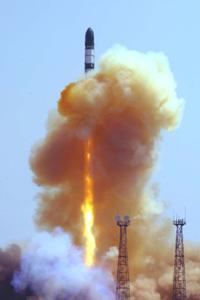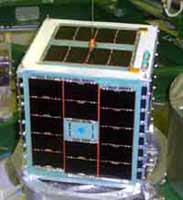 November 29, 2011 – AO-51 not responding to commands
November 29, 2011 – AO-51 not responding to commands
It is with a heavy heart I report that AO-51 has ceased transmission and is not responding to commands. The last telemetry data indicated that the third of six batteries was approaching failure to short, and observations indicate the voltage from three cells is insufficient to power the UHF transmitters. The IHU may continue to be operative. Initial tests with the S band transmitter were also not positive, although more attempts are in order. We have tried leaving the satellite in an expected state where if voltages climb high enough, the 435.150 transmitter may possibly be heard.
 The command team will regularly attempt communications with the satellite over the coming months (and years). There is always the possibility that a cell will open and we could once again talk to our friend while illuminated. Thanks to all who helped fund, design, build, launch, command, and operate AO-51. It’s 7 year mission has been extraordinary. Please support AMSAT’s Fox-1 project, and other AMSAT projects worldwide with your time and money.
The command team will regularly attempt communications with the satellite over the coming months (and years). There is always the possibility that a cell will open and we could once again talk to our friend while illuminated. Thanks to all who helped fund, design, build, launch, command, and operate AO-51. It’s 7 year mission has been extraordinary. Please support AMSAT’s Fox-1 project, and other AMSAT projects worldwide with your time and money.
For the AO-51 Command Team,
73, Drew KO4MA
AMSAT-NA VP Operations

Message send to amsat-bb [at] amsat.org:
Is there an expected state when the voltage is high enough regarding AO-51.
The reason I ask, is to listen and see if there is some life in the
satellite when the voltage becomes high enough when there is full exposure
after the coming eclipse periode.
reply from KO4MA (command station member)
It’s not so much a problem of not enough illumination, but more that we
are running on 3 or 3.5 cells, and we need ~4 to make the transmitters
work. There may be some points during the orbit when the V gets high
enough for the transmitter to come on at low power, but that is
conjecture only. We don’t know when or really even if that will happen.
If a cell opens up in the future, the IHU will immediately crash upon
eclipse, and the battery voltage -may- rise to whatever the panels can
provide. If this happens we may be able to restart the IHU and get a
transmitter running, but it will only last until the next eclipse.
73, Drew KO4MA
Special ANS bulletin
AMSAT-NA VP Operations, Drew Glasbrenner, KO4MA reported today,
“It is with a heavy heart I report that AO-51 has ceased trans-
mission and is not responding to commands.”
Drew wrote, “The last telemetry data indicated that the third of
six batteries was approaching failure to short, and observations
indicate the voltage from three cells is insufficient to power the
UHF transmitters. The IHU may continue to be operative. Initial
tests with the S-band transmitter were also not positive, although
more attempts are in order. We have tried leaving the satellite in
an expected state where if voltages climb high enough, the 435.150
transmitter may possibly be heard.”
The command team will regularly attempt communications with the
satellite over the coming months (and years). There is always the
possibility that a cell will open and we could once again talk to
our friend while illuminated. Thanks to all who helped fund, des-
ign, build, launch, command, and operate AO-51. It’s 7 year mission
has been extraordinary.
Please support AMSAT’s Fox-1 project, and other AMSAT projects world-
wide with your time and money.